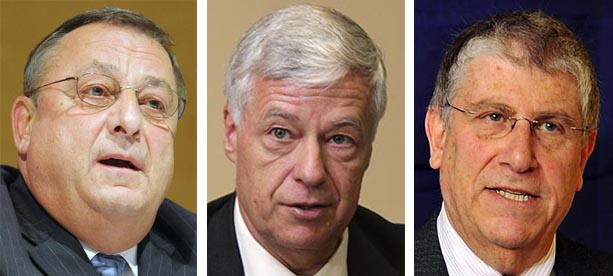A nonprofit group that advocates for public funding of candidates in Maine released a report Tuesday criticizing the high number of large donations that already are shaping next year’s race for governor.
Maine Citizens for Clean Elections analyzed the most recent campaign finance reports filed with the state ethics commission by Republican Gov. Paul LePage, Democratic U.S. Rep. Mike Michaud and independent Eliot Cutler.
The group’s director, Andrew Bossie, said it’s not just the large numbers that are troubling. He said the donations have been dominated by private, wealthy contributors who are not representative of the majority of Maine voters.
“With 14 months to go, it is clear that large, private contributors will play a much more significant role than in recent elections,” Bossie said.
As of June 30, the three candidates had raised more money collectively than the total raised by the same point in the last two gubernatorial races, in 2006 and 2010.
LePage had raised $340,000 for his re-election campaign as of June 30. Michaud had raised $313,000, in only 17 days of fundraising. And Cutler, who has been collecting donations since the beginning of 2013, had $430,000.
In this election, gubernatorial candidates are effectively no longer eligible for public funding under the Maine Clean Election Act. That change came when LePage eliminated funding for gubernatorial candidates as part of his state budget proposal.
Brent Littlefield, LePage’s senior political adviser, criticized the Maine Citizens for Clean Elections report and its findings, although he said he was not speaking for the re-election campaign.
“It is disingenuous for a group to call themselves ‘clean elections’ when the entire reason they exist is to force taxpayers to pay for politicians with money that could be used for economic growth, transportation or education,” Littlefield said in a prepared statement.
David Farmer, a senior adviser to Michaud, said his campaign has challenged some of the numbers cited in the report but that the group is right about two things: Michaud has more small donors and more in-state donors than his opponents.
Farmer said Michaud supports the public campaign financing but may not have run as a Clean Election candidate even if he had that option.
In an email to the Portland Press Herald, Cutler said he is “deeply concerned about the corrosive influence of money in our political system, especially the linkage between lobbyists and PACs.”
He said he supports public funding to “dilute the dominance of big money in our democracy” and is president of a nonprofit group, the Lerner Foundation, that provided a significant grant to Maine Citizens for Clean Elections.
The other change in this election is an increase in the maximum donation, from $1,500 to $3,000. Technically, each donor is supposed to give no more than $1,500 for the primary election and $1,500 for the general election. But LePage and Michaud have no primary challengers at this point, so their donors can give $3,000 up front.
The report estimates that maxed-out donors represent nearly half of the money raised by the three candidates to date.
Big money doesn’t always bring success. In the 2010 race, the candidate with the least money ended up winning. LePage raised $1.2 million, trailing Democrat Libby Mitchell ($1.8 million) and Cutler ($2.1 million). Mitchell was a Clean Election candidate.
Maine Citizens for Clean Elections has been releasing a series of reports over the last two years as part of its Money in Politics Project.
S. Donald Sussman, majority share owner of MaineToday Media, which publishes the Press Herald, is a major contributor to Maine Citizens for Clean Elections. He also has contributed to Michaud’s campaign.
Eric Russell can be contacted at 791-6344 or at:
erussell@pressherald.com
Twitter: @PPHEricRussell
Send questions/comments to the editors.




Comments are no longer available on this story